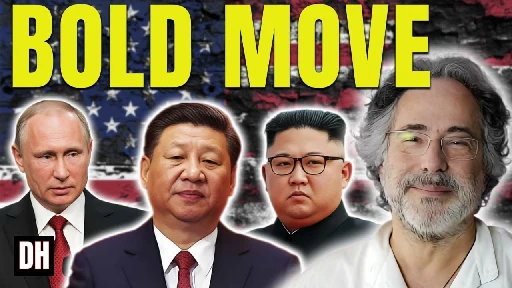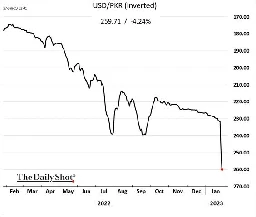Geopolitics
-
Hi, with the coup in Niger, i'm remembering the recent coups in Guinea, Egypt, or Pakistan, appreciated by the west. Do you have other recent examples in mind ?
Myanmar was condemned at the time, even if(, a.f.a.i.k.,) the news of Aung San Suu Kyi's reduction of sentence to 27 years, three weeks ago, didn't make our headlines.
-
The "Euro-Siberian Pipeline Crisis" of the 1980s, friction among Western allies over energy and over trade with Russia
I have been gathering some information about the transatlantic dispute over the Siberian gas pipeline in 1982, in which the Soviet Union sought to build a pipeline to export gas to Europe, in exchange that European companies help with the pipeline's construction (such as by selling parts and technology). My main reason for interest in this is to add context to the fate of Nord Stream 2 (like the comparison in this 2021 article for example).
Europeans were happy with the pipeline deal of the 80s, while the US railed against it, applying sanctions widely on several European companies in an attempt to prevent the pipeline from being built, which was resented by the Europeans who had consented to the pipeline deal, wanted more diversity in their energy sources outside of OPEC, and trusted the Soviet Union to deliver them a good service. The US viewed it as an unacceptable deal because it would enrich the Soviet Union and make Europeans "dependent" on Soviet energy, rather than on the OPEC countries for energy.
Current US Secretary of State Antony Blinken wrote a ~200 page book about this in the late 80s, after the US attempts to foil the pipeline's construction were unsuccessful. His book, Ally Versus Ally, focuses on the fractures among the Western countries over their differences surrounding trade with the Soviet Union and around oil and gas trade in general. He writes that such problems are inevitable in the Western alliance, with the NATO countries only being able to act in a united fashion during wartime or acute tension, while during peacetime, the nature of their relationship as competitive allies breeds disunity, with Europeans naturally tending to want trade with the East, and the US opposing it. He describes this inherent disunity as "a constant weakness in our competition with the Communist world." He writes:
> It might be tempting to view the alliance crisis over the pipeline as an unpleasant but insignificant melodrama that should now be relegated to a footnote in history books. That would be a mistake. What sets the pipeline crisis apart from other alliance squabbles is the fact that it manifested a fundamental difference between the United States and the western Europeans with regard to their policies for East-West relations. These differences date back to the creation of the Western alliance, but came to the fore only in 1982. While the pipeline dispute itself was settled, the larger West-West antagonism of which the crisis was but a symptom remains. [...] In fact, the intra-alliance antagonism is almost certain to produce more disputes like the one surrounding the pipeline, as Europe's export markets continue to shrink and new opportunities for trade with the Eastern bloc open. > > It takes two to trade. The Europeans are willing, the United States opposed, or hesitant at best. For this reason, a dispute within the West is almost certain to arise once again, perhaps over the very next megaproject. But whether it will be contained, as the pipeline crisis was, and at what price, is anyone's guess. This danger facing the alliance can be averted only if the lessons of the pipeline chapter are understood and acted upon. > > The United States and western Europe are partners in a competitive relationship among themselves and in an adversary relationship with the Communist world that will continue into the indefinite future. From time to time, unilateral policies, whether self-serving or sincerely meant to benefit the alliance as a whole, only manage to harm Western economies and breed disunity within NATO. Too often, the Soviet Union and its satellites stand idly on the sidelines, watching the allies attempt to hang each other with a rope of their own making.
I haven't finished reading this book yet, but so far it has covered several angles of the pipeline issue. He is writing in the context of the Cold War and the debate over detente, containment, rollback, etc., but also writing about energy producing countries in general, going into detail about which countries hold what amount of natural resources and how long those resources can last them, etc., and talking about whether the US concern regarding the Soviet Union should be to deny them short term profits or allow them to drain their natural resources by selling them to the West, and how to get US objectives met without causing too much damage to NATO/the Western alliance--basically, he talks about the various points of view on how long Europe's leash should be and why. He also talks about how the US can benefit from buying oil/gas from other nations until the resource is drained from other countries, at which point the US can really tap into its own resources. Also, it's interesting to read his view on what level of interrupted energy delivery is acceptable--basically, if energy cutoff is mainly affecting civilian residences rather than military or industry, it's not a big concern. This comes up in the book because one of the major arguments the US was making was that the Soviets would be able to cut off gas delivery service to Europe. Blinken actually spends some time writing about how historically, the Soviets have actually been quite a reliable trade partner who didn't tend to use energy trade as a threat.
I just thought I would share this here in case anyone else is interested in it. I haven't finished the book yet. I also haven't yet read The Grand Chessboard but I think that's another one that will add context for this (and various other things), so I plan to read it eventually (Wikipedia: "Regarding the landmass of Eurasia as the center of global power, Brzezinski sets out to formulate a Eurasian geostrategy for the United States. In particular, he writes that no Eurasian challenger should emerge that can dominate Eurasia and thus also challenge U.S. global pre-eminence").
-
Pakistan doing great without Imran Khan
> Pakistan’s rupee slumped more than 4% to set a new record low as authorities loosened their grip on the currency to help secure financing from the International Monetary Fund. > > The rupee slid as much as 4.2% to a record 259.7148 per dollar, after a 7% drop on Thursday, according to data compiled by Bloomberg. A more market-determined currency is among the key demands for the IMF to resume its $6.5 billion bailout, which has been stalled for months. > > Prime Minister Shehbaz Sharif is battling to keep its economy afloat as power outages, dollar shortages, and political tensions threaten to sink the nation deeper into crisis. Loan negotiations scheduled for next week will give officials another opportunity to persuade the IMF to release the much-needed funds, and help rebuild the nation’s foreign-exchange reserves. > > The rupee’s slide this week was triggered by the decision of Pakistan’s money exchange companies to abolish the limit on the dollar-rupee rate in the open market. Supply of dollars among onshore money-changing businesses has dried up as locals turned to the black market, as the greenback was being sold at about 10% above advertised rates.
https://www.hindustantimes.com/world-news/pakistani-rupee-plunges-to-record-low-of-more-than-rs-255-per-dollar-report-101674806197873.html
-
Over a dozen countries are potentially joining BRICS
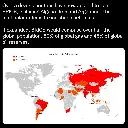
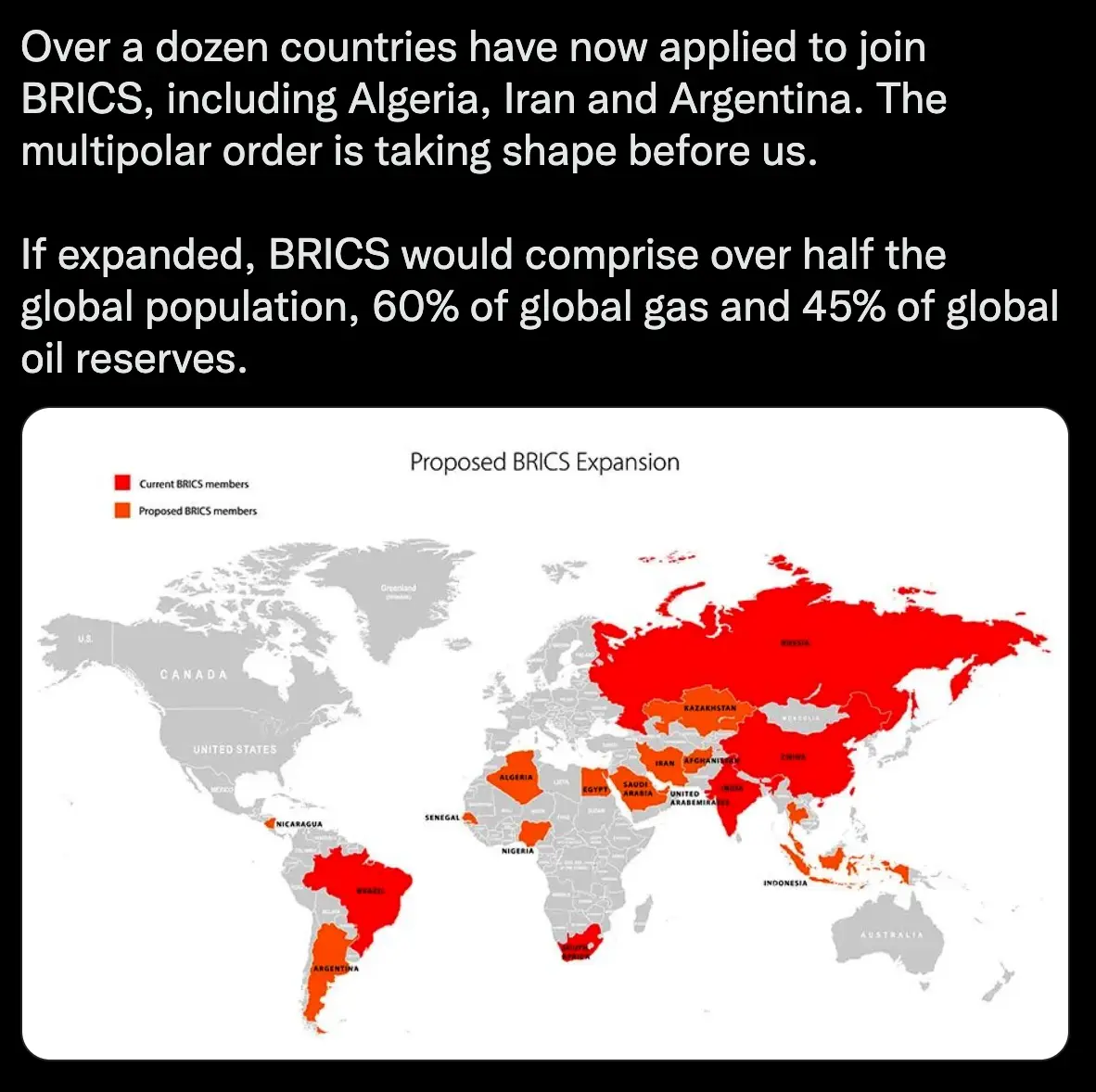
Some of these potential member states seem to have diametrically opposed interests, particularly Iran and Saudi Arabia. In your opinion, who amongst these potential states will actually be accepted?
-
La tubería Nord Stream 2 que molesta a las petroleras de EEUU
mundoglobal.blog UCRANIA: CÓCTEL DE GAS, NEONAZIS, OTAN Y OLIGARCAS RUSOSEl profético ensayo de Glen Ford de 2014 sobre la geopolítica de Ucrania expone los problemas centrales que animan el conflicto: los intereses energéticos y el poder económico de EE. UU. Decía Ford…
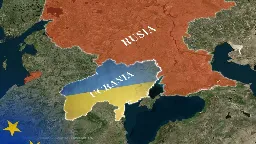
-
La realidad indica que la “aldea global” hoy no puede prescindir de la actividad minera. Entonces hay que revisar los daños sociales, culturales y al medio ambiente, para minimizarlos y controlarlos c
mundoglobal.blog MINERÍA ¿SI O NO?La minería es una de las actividades más antiguas de la humanidad. Todos los materiales utilizados por la sociedad moderna tienen su origen en sustancias minerales obtenidas por la minería o …
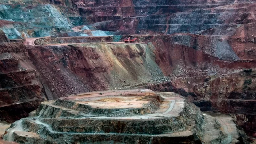
-
OFFSHORE BOATS: Shipping companies also cheat.
mundoglobal.blog LOS BARCOS OFFSHOREHay empresas offshore, hay arte offshore y también hay barcos offshore. En todos los casos la comunidad mundial es la perjudicada, y los cómplices necesarios son las grandes potencias económicas, p…
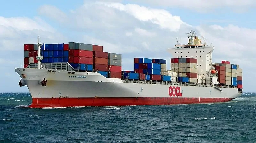
- mundoglobal.blog LATINOAMÉRICA y una oportunidad inesperada: IMPUESTO MÍNIMO GLOBAL
Los impuestos han existido desde que el mundo es mundo; en América los Reyes europeos y en menor medida los Virreyes americanos impusieron una serie de impuestos. Gabella: impuesto aplicado a la ve…

